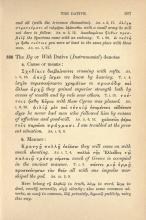519. Three cases, once distinct, are blended in the Greek Dative. These are
1. The true Dative, the To or For case.
2. The Instrumental (or Sociative), the With or By case.
3. The Locative, the At or In case.
The English prepositions to and for, with and by, at and in, cover fairly the three sets of uses; but there are many differences of idiom.
The dative is used mostly with verbs and adjectives, but also with nouns, adverbs, and prepositions.
520. The To Dative is used with verbs to denote the indirect object.
Ταῦτα ἀπαγγελῶ βασιλεῖ.
This I will report to the king.
Xen. Anabasis 2.3.24
ταῦτα τοῖς φίλοις διεδίδου.
These he used to distribute to his friends.
Xen. Anabasis 1.9.22
ἀλλὰ φιλοσόφῳ ἔοικας.
Why, you seem like a philosopher.
Xen. Anabasis 2.1.13
a. Many Greek verbs take the dative though the corresponding English verb takes a direct object, or requires some other preposition than to.
Ἐπίστευον αὐτῷ.
They trusted him.
Xen. Anabasis 1.2.2
πείσομαι μᾶλλον τῷ θεῷ ἤ ῡ̔μῖν.
I shall obey the god rather than you.
Plato Apology 29d
Κῡ́ρῳ πειθαρχεῖν
to be obediant to Cyrus
Xen. Anabasis 1.9.17
ἐμοὶ ὀργίζονται.
They get angry at me.
Plato Apology 23c
τῷ θεῷ βοηθῶν
aiding the god
Plato Apology 23b
τοῖς Ἀθηναίοις παρῄνει.
He used to advise the Athenians.
Thucydides 1.93.7
ἕπεσθε τῷ ἡγουμένῳ.
Follow your leader.
Xen. Anabasis 2.2.4
So with ἐπιτῑμῶ, μέμφομαι, ἐγκαλῶ (blame), φθονῶ (envy), ὀνειδίζω (reproach), τῑμωρῶ (avenge one), ὑπισχνοῦμαι (promise), and many others. Some verbs (as μέμφομαι, ὀνειδίζω, ἐπιτῑμῶ) take sometimes the accusative and sometimes the dative.
b. Here belong some semi-impersonal verbs, the subject of which is not an acting person, but a thing or an act.
Ἐμοὶ μελήσει.
It shall be my care.
Xen. Anabasis 1.4.16
μεταμελήσειν αὐτῷ.
He will repent (it will repent him).
Lysias 16.2
ἐδόκει ἤδη πορεύεσθαι αὐτῷ ἄνω.
It now seemed best to him to march up (from the coast).
Xen. Anabasis 1.2.1
τῇ ἡλικίᾱͅ ἔπρεπε.
It was suitable to his age.
Xen. Anabasis 1.9.6
So also ἔξεστι (it is possible), δεῖ μοί τινος (I need something), μέτεστί μοί τινος (I have a share in something), etc.
521. The To Dative may denote the person to whom (rarely the place to which) with verbs of motion.
Tοῦτόν σοι ἔπεμψε.
This (wine) he sent to you.
Xen. Anabasis 1.9.25
Σαμίοις ἦλθεν.
He went to the Samians.
Thucydides 1.13.3
Ἰ̄λίῳ Πάρις ἠγάγετʼ Ἑλένᾱν.
Paris brought Helen to Ilion.
Eur. Andromache 103–104
πόνος πόνῳ πόνον φέρει.
Toil to toil brings toil.
Soph. Ajax 866
Much oftener these verbs take πρός with the accusative in this sense.
522. The To Dative is used also with some adjectives, adverbs, and nouns, more or less like the above verbs in meaning.
Tοῖς πολεμίοις ἐναντίους
opposed to the enemy
Xen. Anabasis 3.2.10
τὰ κρέᾱ ἦν παραπλήσια τοῖς ἐλαφείοις.
The meat was like venison.
Xen. Anabasis 1.5.2
θάνατον πᾶσι κοινὸν εἶναι καὶ ἀναγκαῖον ἀνθρώποις
that death is common to all and inevitable for man
Xen. Anabasis 3.1.43
ἀλλά μοι δῆλόν ἐστι τοῦτο.
But this is clear to me.
Plato Apology 41d
ἡ ἐμὴ τῷ θεῷ ὑπηρεσίᾱ
my service to the god
Plato Apology 30a
σφίσιν αὐτοῖς μόνον ἐπιτηδείως
advantageously to themselves only
Thucydides 1.19.1
πυρὸς βροτοῖς δοτῆρʼ ὁρᾷς.
Thοu seest the giver of fire to mortals.
Aesch. Prometheus Bound 612
So with εὔνους (friendly), ἐχθρός (unfriendly), πολέμιος (hostile), φανερός (plain), ἄδηλος (uncertain), ἀπρεπής (unbecoming), and many others.
523. The For Dative is used (with verbs, adjectives, adverbs, and nouns) to denote the person or thing interested or affected.
Tὰ ἄκρα ἡμῖν προκαταλαμβάνειν
to seize the heights beforehand for us
Xen. Anabasis 1.3.16
ταῦτα καὶ νεωτέρῳ καὶ πρεσβυτέρῳ ποιήσω.
This I shall do for both younger and older.
Plato Apology 30a
φεύγειν αὐτοῖς ἀσφαλέστερον ἢ ἡμῖν.
Fleeing is safer for them than for us.
Xen. Anabasis 3.2.19
χαλεπὸν ἦν ἐμοί.
It was difficult for me.
Thucydides 1.22.1
τὸ γὰρ ἔρυμα τῷ στρατοπέδῳ οὐκ ἂν ἐτειχίσαντο
else they would not have built the wall for their camp
Thucydides 1.11.1
τοῖς ἀσθενέσι τροφῆς ἕνεκα
for the sake of support for the weak
Thucydides 1.5.1
οὐ σύ μοι τῶνδʼ αἰτίᾱ;
Are not you the cause of this for me?
Soph. Electra 295
μέγιστον κόσμον ἀνδρί
the greatest ornament for a man
Xen. Anabasis 1.9.23
σῑτηρέσιον μόνον τῇ δυνάμει
ration-money alone for the force
Demosthenes 4.28
a. Greek often expresses a for relation where English puts the matter in some other way.
Ἀνάβηθί μοι καὶ ματύρησον.
Come up, please (for me), and testify.
Lysias 16.8
σπονδαὶ μὲν μένουσι, ἀπιοῦσι δὲ ἢ προϊοῦσι πόλεμος
a truce if we stay here, but war if we withdraw or advance (for us remaining, for us withdrawing, etc.)
Xen. Anabasis 2.1.23
σφῷν μὲν ἐντολὴ Διὸς ἔχει τέλος.
For you (So far as you are concerned) the command of Zeus hath consummation.
Aesch. Prometheus Bound 12–13
συνελόντι δʼ ἁπλῶς
to put it simply (for one putting it simply).
Demosthenes 4.7
τῑμῆς ἄξιος τῇ πόλει
worthy of honor from (with reference to) the state.
Xen. Memorabilia 1.2.62
οὕτως ἀταλαίπωρος τοῖς πολλοῖς ἡ ζήτησις τῆς ἀληθείᾱς.
So lightly dο the multitude take (so unlaborious for the multitude is) the search for truth.
Thucydides 1.20.3
οὔτοι τι σοὶ ζῶ δοῦλος ἀλλὰ Λοξίᾱ.
In no degree as servant to you do I live, but to Loxias.
Soph. Oedipus the King 410
524. The For Dative also denotes
a. The Possessor, with εἰμι, γίγνομαι, and the like.
Ἐνταῦθα Κῡ́ρῳ βασίλεια ἦν.
There Cyrus had a palace.
Xen. Anabasis 1. 2.7
ἐγένετο αὐτοῖς ἡ ἰδίᾱ παρασκευὴ μείζων.
Their individual preparation became greater (the preparation became greater for them).
Thucydides 1.19
ὄνομα αὐτῇ Κορσώτη.
Its (the cityʼs) name was Korsote.
Xen. Anabasis 1.5.4
ἀνάγκη ἐστί μοι.
It is necessary for me.
b. The Agent, regularly with the verbal in -τέος (§ 596), often with the perfect and pluperfect passive.
Ἐμοὶ τοῦτο οὐ ποιητέον.
This must not be done by me.
Xen. Anabasis 1.3.15
πάνθʼ ἡμῖν πεποίηται.
It is all done by us.
Xen. Anabasis 1.8.12
τὰ τούτοις ἐψηφισμένα
the measures voted by these men
Lysias 12.30
c. The possessor or the agent in these constructions is really the person interested or affected, so that in essence these cases fall under § 523 (above); but usually for can not be used in translating.
525. The With Dative (Sociative) is used, of person or thing, with words implying association of any kind whatever.
Ἐπολέμει τοῖς Θρᾱͅξί.
He carried on war with the Thracians.
Xen. Anabasis 1.1.9
σοφοῖς ὁμῑλῶν καὐτὸς ἐκβήσῃ σοφός.
By being with wise men you will yourself become wise.
Menander FCG 475
οὐκ ἀντιποιούμεθα βασιλεῖ τῆς ἀρχῆς.
We do not dispute with the king for the sovereignty.
Xen. Anabasis 2.3.23
οἴνῳ κεράσᾱς αὐτήν
mixing it (the spring) with wine
Xen. Anabasis 1.2.13
ἅμα τῇ ἡμέρᾱͅ
at daylight (with the day).
Xen. Anabasis 2.1.2
ἐκ διαδοχῆς ἀλλήλοις
in relays with each other
Demosthenes 4.21
a. Note some typical idioms
Tέτταρας ναῦς ἔλαβον αὐτοῖς ἀνδράσι.
They took four ships with the crews (with the men themselves).
Xen. Hellenica 1.2.12
μὴ ἡμᾶς αὐταῖς ταῖς τριήρεσι καταδῡ́σῃ
lest he sink us triremes and all (with the triremes themselves)
Xen. Anabasis 1.3.17
ὀλίγῳ στρατεύματι οὐ τολμήσει ἐφέπεσθαι.
With a small army he will not dare to follow.
Xen. Anabasis 2.2.12
Λακεδαιμόνιοι ἦλθον πρεσβείᾱͅ.
The Spartans came with an embassy.
Thucydides 1.90
ἐν ταὐτῷ γε ἦσθα τούτοις.
You were at least in the same place with these men.
Xen. Anabasis 3.1.27
526. The By or With Dative (Instrumental) denotes
a. Cause or means.
Σχεδίαις διαβαίνοντες
crossing with rafts
Xen. Anabasis 1.5.10
ἀκοῇ ἴσμεν.
We know by hearing.
Thucydides 1.4
ἰσχὺν περιεποιήσαντο χρημάτων τε προσόδῳ καὶ ἄλλων ἀρχῇ.
They gained superior strength both by access of wealth and by rule over others.
Thucycides 1.15.1
τούτοις ἥσθη Κῦρος.
With these Cyrus was pleased.
Xen. Anabasis 1.9.26
φιλίᾱͅ μὲν καὶ εὐνοίᾱͅ ἑπομένους οὐδέποτε εἶχεν.
He never had men who followed him by reason of affection and gοod-will.
Xen. Anabasis 2.6.13
χαλεπῶς φέρω τοῖς παροῦσι πρᾱ́γμασιν.
I am troubled at the present situation.
Xen. Anabasis 1.3.3
b. Manner.
Κραυγῇ πολλῇ ἐπίᾱσιν.
They will come on with much shouting.
Xen. Anabasis 1.7.4
πολλὰ τῆς Ἑλλάδος τῷ παλαιῷ τρόπῳ νέμεται.
Much of Greece is occupied in the ancient manner.
Thucydides 1.5.3
πάντες μιᾷ ὁρμῇ προσεκύνησαν τὸν θεόν.
All with one impulse worshiped the god.
Xen. Anabasis 3.2
Here belong τῇ ἀληθείᾱͅ (in truth), λόγῳ (in word), ἔργῳ (in deed), σπουδῇ (earnestly), σῑγῇ (silently); also some common adverbs, as κοινῇ (in common), ἰδίᾱͅ (privately), δημοσίᾱͅ (publicly), ταύτῃ (this way).
c. The Measure of Difference, with a comparative, superlative, or any word implying comparison.
Ὀλίγῳ πλείω
a little more
οὐ πολλοῖς ἔτεσιν ὕστερον
not many years later
Thucydides 1.18.1
κάκιστα δὴ μακρῷ κάτειμι.
Most wretchedly by far do I go down.
Soph. Antigone 895–896
τέχνη δʼ ἀνάγκης ἀσθενεστέρᾱ μακρῷ.
Art is far weaker than Necessity.
Aesch. Prometheus Bound 514
527. The At or In Dative (Locative) denotes
a. The Place where (in nouns of place), mostly poetic.
Δόμοις δέχεσθαι
to receive in their dwellings
Soph. Oedipus the King 818
ἔτι μέγας οὐρανῷ Zεύς.
Zeus is still great in heaven.
Soph. Electra 175
περιέρρεῖτο ὑπὸ τοῦ Μάσκᾱ κύκλῳ.
It was flowed around in a circle (was completely surrounded) by the Maskas.
Xen. Anabasis 1.5.4
In prose a few proper names are so used (cp. § 228), especially names of demes: Mαραθῶνι (at Marathon), Mελίτῃ (in Melite). But generally a preposition precedes: ἐν τῇ οἰκίᾱͅ (in the house).
Also figuratively, of State or Condition.
Oὐχ ὕπνῳ γʼ εὕδοντα
not slumbering in sleep
Soph. Oedipus the King 65
φροντίδος πλάνοις
in the wanderings of anxious thought
Soph. Oedipus the King 67
ταῖς ψῦχαῖς ἐρρωμενέστεροι
stronger in their souls
Xen. Anabasis 3.1.42
Examples like the last shade naturally into the following.
b. The Particular, or the special sense, in which something is meant (Specifying Dative; sometimes possibly instrumental, but we more often use in).
Bοιωτιάζων τῇ φωνῇ
like a Boiotian in pronunciation
Xen. Anabasis 3.1.26
οἱ δοκοῦντες διαφέρειν εἴτε σοφίᾱͅ εἴτʼ ἀνδρείᾱͅ εἴτʼ ἄλλῃ ἡντινιοῦν ἀρετῇ
those who are thought superior whether in wisdom or in bravery or in any other virtue whatever
Plato Apology 35a
c. The Time when, in nouns of time with a specifying word, and in names of festivals.
Tῇ ὑστεραίᾱͅ
on the next day
μιᾷ νυκτί
in one night
δεκάτῳ ἔτει ξυνέβησαν.
They came to terms in the tenth year.
Thucydides 1.103.1
Παναθηναίοις
at the Panathenaia
528. The following table shows the relations between the Greek and Latin cases and the older case system. The nominative, accusative, and vocative remained distinct in both languages.
| Greek | Old Cases | Latin |
| Genitive | Genitive | Genitive |
| Ablative (from) | Ablative | |
| Dative | Instrumental (with, by) | |
| Locative (at, in) | ||
| Dative (to, for) | Dative |








